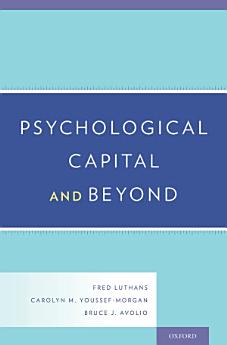Psychological Capital and Beyond
ก.พ. 2015 · Oxford University Press
4.3star
3 รีวิวreport
eBook
248
หน้า
family_home
มีสิทธิ์
info
reportคะแนนและรีวิวไม่ได้รับการตรวจสอบยืนยัน ดูข้อมูลเพิ่มเติม
เกี่ยวกับ eBook เล่มนี้
Although there are as many answers to the question of how organizations can gain competitive advantage in today's global economy as there are books and experts, one lesson seems very clear: traditional answers and resources are no longer sufficient. This seminal book offers not only an answer regarding how to gain competitive advantage through people, but also a brand new, untapped human resource--psychological capital, or simply PsyCap. Generated from both the positive-psychology movement and the authors' pioneering work on positive organizational behavior, PsyCap is a rigorous concept: to be included in PsyCap, a given positive construct must be based on theory, research, and valid measurement, must be open to development, and must have measurable performance impact. The positive constructs that have been determined to best meet these PsyCap criteria--efficacy (confidence), hope, optimism, and resiliency--are covered in separate chapters in Psychological Capital and Beyond. Following an exploration of other potential positive constructs such as creativity, wisdom, well-being, flow, humor, gratitude, forgiveness, emotional intelligence, spirituality, authenticity, and courage, the authors summarize the research demonstrating the performance impact of PsyCap. They go on to provide the PsyCap Questionnaire (PCQ) as a measurement tool, and the PsyCap Intervention (PCI) as a development aid. Psychological Capital and Beyond provides theory, research, measurements, and methods of application for psychological capital, a resource that can be developed and sustained for competitive advantage. Each copy includes a complimentary PsyCap online self-assessment.
การให้คะแนนและรีวิว
4.3
3 รีวิว
เกี่ยวกับผู้แต่ง
Fred Luthans, PhD, is University and Distinguished Professor at the University of Nebraska, Lincoln. The former president of the National Academy of Management and currently editor of three journals, he is the author of several widely known books and over 200 academic articles. His teaching and consulting have taken him all over the world. Carolyn Youssef, PhD, is the Redding Chair of Business and a core faculty member in the PhD in Human Capital Management program at Bellevue University. Her research has been published in a number of journals and edited volumes. She also serves in the U.S. Technical Advisory Group, designated by the Society for Human Resource Management, the American National Standards Institute, and the International Organization for Standardization to create and represent the United States' view on global human-resource standards. Bruce J. Avolio, PhD, has an international reputation as a researcher and practitioner in leadership. He was recently ranked in the top 25 management scholars of the last 50 years. He has consulted with public and private organizations in North and South America, Africa, Europe, and Southeast Asia. He has published 11 books and over 150 articles on leadership and related areas and is Professor of Management at the University of Washington's Foster Center for Leadership.
ให้คะแนน eBook นี้
แสดงความเห็นของคุณให้เรารับรู้
ข้อมูลในการอ่าน
สมาร์ทโฟนและแท็บเล็ต
ติดตั้งแอป Google Play Books สำหรับ Android และ iPad/iPhone แอปจะซิงค์โดยอัตโนมัติกับบัญชีของคุณ และช่วยให้คุณอ่านแบบออนไลน์หรือออฟไลน์ได้ทุกที่
แล็ปท็อปและคอมพิวเตอร์
คุณฟังหนังสือเสียงที่ซื้อจาก Google Play โดยใช้เว็บเบราว์เซอร์ในคอมพิวเตอร์ได้
eReader และอุปกรณ์อื่นๆ
หากต้องการอ่านบนอุปกรณ์ e-ink เช่น Kobo eReader คุณจะต้องดาวน์โหลดและโอนไฟล์ไปยังอุปกรณ์ของคุณ โปรดทำตามวิธีการอย่างละเอียดในศูนย์ช่วยเหลือเพื่อโอนไฟล์ไปยัง eReader ที่รองรับ





